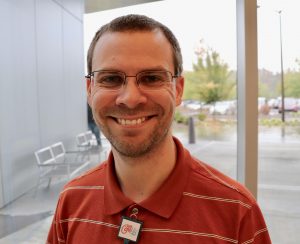In this interview, Geriatrics Specialty Clinic social worker Bryan Godfrey, MSW, describes how he helps patients with a range of challenges and needs. He also describes Clinic services such as nutrition and pharmacy consults that complement our core geriatric medical expertise.
What is the role of the social worker at UNC’s Geriatrics Specialty Clinic?
There are two big components. First is the assessment and connection phase, which means meeting someone right where they are and helping them explore their strengths, their barriers, and what they need in this moment. And that’s something that can really take some work, because what is immediately needed may not be obvious. We may know what the problem is, but we may not understand how to go about solving it, or if there even is a solution. … Is the situation something that needs to be accepted, or worked around, or actually solved?

Then we move into the problem-solving phase, when the connection to resources comes in. This can involve community resources, whether it’s a community program or support group, or a nonprofit that provides caregiver support, or even something as simple as a therapist – or discovering a different way of looking at something where a possibility opens up that you didn’t see before.
What are some additional resources at the Clinic?
We definitely have resources here in the Clinic that people might not be aware of. Dr. Julia Lunsford is a good example, with psychiatry. With a referral from one of our geriatric providers, Dr. Lunsford can consult with patients on mood disorders, dementia-related concerns, and more.
Also, our nutritionist Melissa Walter (RDN, LDN) is here every Thursday to help patients with dietary issues or food concerns. Then there’s Jena Burkhart, our pharmacist, who can meet with patients to review medications and help resolve any issues. Or, if people have questions about certain medications, or they’ve heard conflicting things about a medicine, or wonder whether potential side effects are worth the benefits of taking a medication, Jena can help.
It can be hard to find these supports, so we’re glad to be able to offer them in our Clinic. And if patients simply want chat with me, I can do one-off therapy sessions. If someone just needs to vent about something or there’s a decision to be made that they’re struggling with, they can come in and together we’ll look at what they’re dealing with.
Tell us more about the support you provide.
Sometimes caregivers are just beginning in their role, and they want to sit down and go over the whole caregiving trajectory. I love doing this. They’ll say, ‘What should I expect? What happens if I can’t provide enough care? What if I get burned out? Or, what’s going to happen when we run out of money?’
I want people to know that no matter how bad it gets, there’s always some option available to you. We’ll at least find some sort of placement for them, somewhere. It may not be the first choice, but at that moment, it might be what’s needed.
And options do exist to help people stay in their home. For example, Pace programs offer daytime care while people continue to live at home. There are two PACE programs in our area, one in Burlington and another in Pittsboro. Or, we can look for support to hire a caregiver to come to the home and help, whether it’s free, or subsidized, or an out-of-pocket payment. There are all kinds of different options. And that’s the community resources component.
I build a relationship with the person and get them to a space where they understand their options, pros and cons, in a way that is genuine and not like ‘really, you should do this.’ That’s where I come in: to strike that delicate balance between ‘this is what your provider recommends and this is where you are. How do you feel about that?’
On the benefits of listening …
There’s a good number of people, especially caregivers, who come to our Clinic and the thing that they need most pressingly from me is to be heard and for their struggle to be validated. Being a caregiver is very often very difficult. It’s not necessarily a role that people signed up for. Caregivers need to be able to come in and be heard, knowing someone listened and cared, and that they’ve got someone in their corner who will do their best to help.
You can hear more from Bryan in a January 2019 WUNC story on depression in older adults.